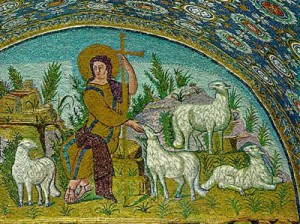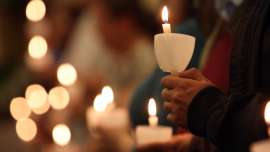
What Are We to Do?
Easter’s empty tomb is a call to conversion.
By this tomb, we should know for certain that God has made Jesus both Lord and Messiah, as Peter preaches in today’s First Reading.
He is the “Lord,” the divine Son that David foresaw at God’s right hand (see Psalms 110:1,3; 132:10-11; Acts 2:34). And He is the Messiah that God had promised to shepherd the scattered flock of the house of Israel (see Ezekiel 34:11-14, 23; 37:24).
As we hear in today’s Gospel, Jesus is that Good Shepherd, sent to a people who were like sheep without a shepherd (see Mark 6:34; Numbers 27:16-17). He calls not only to the children of Israel, but to all those far off from Him—to whomever the Lord wishes to hear His voice.
The call of the Good Shepherd leads to the restful waters of Baptism, to the anointing oil of Confirmation, and to the table and overflowing cup of the Eucharist, as we sing in today’s Psalm.
Again on this Sunday in Easter, we hear His voice calling us His own. He should awaken in us the response of those who heard Peter’s preaching. “What are we to do?” they cried.
We have been baptized. But each of us goes astray like sheep, as we hear in today’s Epistle. We still need daily to repent, to seek forgiveness of our sins, to separate ourselves further from this corrupt generation.
We are called to follow in the footsteps of the Shepherd of our souls. By His suffering He bore our sins in His body to free us from sin. But His suffering is also an example for us. From Him we should learn patience in our afflictions, to hand ourselves over to the will of God.
Jesus has gone ahead, driven us through the dark valley of evil and death. His Cross has become the narrow gate through which we must pass to reach His empty tomb—the verdant pastures of life abundant.
Theodore of Mopsuestia Commentary on St John’s Gospel
Blessed Moses is the doorkeeper of this sheepfold, having established it on the precepts of the law to allow those who lead their lives according to its norms to live by them in full security.
The shepherd… leads men like sheep to the pastures of sound doctrine, showing them the food of the word: that on which they must feed at the beginning and that on which they should feed later on. He reveals to them the inner meaning of these words, how Scripture should be understood and also which teaching ought to be set aside, teaching which, perhaps, others will deceivingly teach them to the loss of the sheep…
“Let us seek out, then,” says the Lord to the Pharisees, “whether you or I go in by the entrance that the Law prescribes; which of us zealously fulfils the Law’s precepts; to whom Moses, the keeper of the sheepfold, truly opens the door; to whom he grants the praise and honor due to his deeds; whom he declares to be the true shepherd. If Moses praises in his book him who fulfils the precepts of the Law, then there is no doubt that the fulfillment of these precepts is to be found, not in you, but in me…
“Without lifting a finger to help the sheep, you seek nothing but your own advantage. That is why you have no authority at all to drive away anyone… But it is with good reason and just cause that I am called shepherd, for in the first place I have carefully observed the Law; then I have taken the door the Law prescribes and which the doorkeeper himself has shown me; and finally, I have zealously carried out everything that needs to be done for the good of the sheep.”
William of Saint-Thierry
Meditations, 6, 4-6 (SC 324, p. 111)
“Amen, amen, I say to you, I am the gate for the sheep”
John, that Beloved Disciple of yours, was not the only one to find the way to heaven (Rv 4,1), nor was the open door revealed to him alone… You have proclaimed openly: “I am the door; if anyone enters in by me, he shall be saved.”
You are the door, then, Lord… But of what use is it to us who are on earth to see the door in heaven standing open, when we cannot get up there? Paul answers thus: “He who ascends is the same also as he who descended.” (Eph 4,10). Who is he? He is love. For love in us mounts up to you, O Lord, because the love in you comes down to us. You who loved us, you came down to us; by loving you we shall mount up to you. You who yourself declared: “I am the door;” by your own self I pray you, open yourself to us, that you may show more clearly what house you open… The house of which you are the door is heaven, as we said before; and heaven is where the Father dwells, of whom we read: “The Lord’s seat is in heaven” (Ps 10,4).
And truly “nobody comes to the Father except by you” (Jn 14,6), who are the door… Then answer us who seek and yearn for you, I beg: “Master where do you dwell?” (Jn 1,38). You answer promptly, saying: “I am in Father, and the Father is in me” (Jn 14,11); and, in another place: “On day you shall know that I am in the Father, and you in me, and I’ you” (Jn 14,20)… The Father, then, is where you are, and you are where the Father is. Nor is that all; for we are where you are, and you are where we are.
Pope Benedict XVI
Regina Caeli, May 15, 2011
The Liturgy of the Fourth Sunday of Easter presents to us one of the most beautiful images that has portrayed the Lord Jesus since the earliest centuries of the Church: the Good Shepherd. The Gospel of St John, in chapter 10, describes the special features of the relationship between Christ the Good Shepherd and his flock, a relationship so close that no one will ever be able to snatch sheep from his hand. Indeed, the sheep are united to him by a bond of love and of reciprocal knowledge, which guarantees to them the immeasurable gift of eternal life.
At the same time, the flock’s attitude to the Good Shepherd, Christ, is presented by the Evangelist with two specific verbs: “to listen” and “to follow”. These terms suggest the fundamental characteristics of those who live out the following of the Lord.
First of all by listening to his word, from which faith is born and by which it is nurtured. Only those who are attentive to the Lord’s voice can assess in their own conscience the right decisions for acting in accordance with God. Thus the following of Jesus derives from listening: we act as disciples only after hearing and inwardly accepting the Master’s teachings in order to put them into practice every day.
On this Sunday, therefore, it comes naturally to remember to God the pastors of the Church and those who are training to become pastors. I therefore invite you to say a special prayer for the bishops – including the Bishop of Rome! – for the parish priests, for all those who have responsibilities in the guidance of Christ’s flock, so that they may be faithful and wise in carrying out their ministry. In particular, let us pray for vocations to the priesthood on this World Day of Prayer for Vocations, so that effective workers in the Lord’s harvest may never be lacking.
